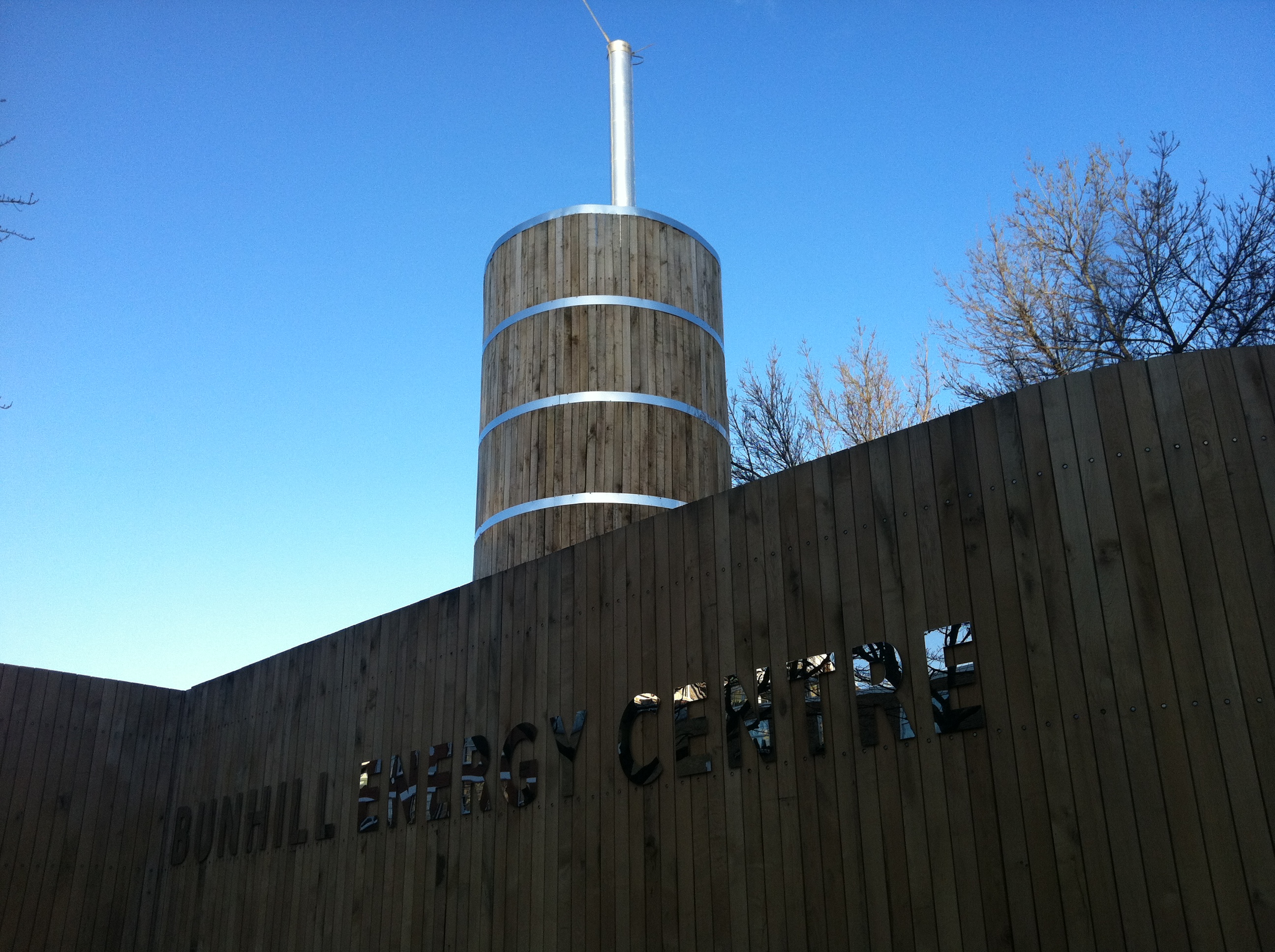Site search:
-
What’s new?
Energy for London Tags
Brent Buildings Camden Carbon Emissions CHP Cities Climate Adaptation Community Heating Community Initiatives Croydon Data DECC Decentralised Energy Distribution ECO Energy Costs Energy Efficiency Enfield FIT Fuel Poverty Funding Green Deal Hackney Haringey Housing Islington Lambeth Library Local Authorities Mayor Newham Ofgem Olympics Photovoltaics Planning RE:FIT RE:NEW Renewable Energy Retrofit Southwark Tower Hamlets Transport Waltham Forest Waste WestminsterEnergy Archives:
- February 2021 (1)
- January 2021 (15)
- December 2020 (15)
- November 2020 (9)
- October 2020 (3)
- August 2020 (5)
- July 2020 (3)
- June 2020 (4)
- April 2020 (10)
- March 2020 (5)
- February 2020 (2)
- January 2020 (3)
- October 2019 (1)
- September 2019 (4)
- August 2019 (2)
- July 2019 (1)
- August 2018 (1)
- November 2016 (8)
- October 2016 (8)
- September 2016 (2)
- August 2016 (8)
- July 2016 (14)
- April 2016 (12)
- March 2016 (16)
- February 2016 (8)
- January 2016 (4)
- December 2015 (1)
- November 2015 (1)
- October 2015 (16)
- September 2015 (3)
- June 2015 (1)
- May 2015 (1)
- April 2015 (1)
- March 2015 (1)
- February 2015 (1)
- January 2015 (1)
- December 2014 (18)
- November 2014 (4)
- August 2014 (8)
- July 2014 (7)
- June 2014 (25)
- May 2014 (8)
- April 2014 (4)
- March 2014 (12)
- February 2014 (7)
- January 2014 (13)
- December 2013 (11)
- November 2013 (15)
- October 2013 (15)
- September 2013 (18)
- August 2013 (5)
- July 2013 (20)
- June 2013 (33)
- May 2013 (8)
- April 2013 (16)
- March 2013 (25)
- February 2013 (14)
- January 2013 (20)
- December 2012 (23)
- November 2012 (23)
- October 2012 (25)
- September 2012 (14)
- July 2012 (12)
- June 2012 (43)
- May 2012 (20)
- April 2012 (8)
- March 2012 (40)
- February 2012 (39)
- January 2012 (40)
- December 2011 (22)
- November 2011 (40)
- October 2011 (33)
- September 2011 (48)
- August 2011 (40)
- July 2011 (58)
- June 2011 (41)
- May 2011 (80)
- April 2011 (38)
- March 2011 (33)
- February 2011 (25)
- January 2011 (24)
- December 2010 (3)
- November 2010 (7)
- October 2010 (6)
- September 2010 (7)
- August 2010 (1)
- July 2010 (2)
- June 2010 (4)
- May 2010 (1)
- March 2010 (3)
- February 2010 (3)
- December 2009 (5)
- November 2009 (2)
- October 2009 (3)
- July 2009 (3)
- June 2009 (1)
- April 2009 (1)
- March 2009 (1)
- February 2009 (1)
- January 2009 (1)
- December 2008 (2)
- October 2008 (1)
- September 2008 (1)
- July 2008 (1)
- March 2008 (2)
- January 2008 (2)
- October 2007 (1)
- September 2007 (3)
- July 2007 (1)
- March 2007 (1)
- February 2007 (3)
- November 2006 (3)
- August 2006 (1)
- February 2006 (1)
- May 2005 (1)
- February 2004 (1)
Tag Archives: CHP
London installations removed from EUETS
6 December 2012: Ahead of the start of Phase III of the EU Emissions Trading Scheme (EUETS), which starts on 1 January 2013, DECC has today introduced new legislation which looks to simplify the rules around the CO2 ‘cap and trade’ scheme.
The EUETS covers around 1,100 energy-intensive industrial installations in the UK such as power stations, refineries and large manufacturing plants. Not surprisingly, not many of these participants are located at London, however, there are a few at the very lowest end of the EUETS requirements, and it is these sites which are addressed in the changes made today. DECC’s press release states that these ‘small emitters’, many of which are hospitals, have been given the opportunity to “‘opt-out’ of the EU ETS from 2013 into a lighter touch alternative scheme, which will address the disproportionately higher administrative costs faced by these installations.”
The ‘opt out’ list includes the following schemes in London:
- Bloomsbury Heat & Power
- The Natural History Museum Boilerhouse
- St. Thomas’ Hospital
- Guys Hospital
- Great Ormond Street Hospital for Children NHS Trust
- Chelsea and Westminister Hospital
- Royal Free Hospital Hampstead
- St Georges Healthcare NHS Trust
- Pimlico District Heating Undertaking (PDHU) Pump House
Other sites include the Hammersmith Hospital Energy Centre and the University College London Hospital.
Common to many of these installations is that they had chosen to utilise Combined Heat and Power (CHP) systems to provide greater energy resilience on site, access more affordable heat and power, and reduce the site’s overall environmental impact related to energy consumption. However, by choosing to install more energy efficient generation directly on site, rather than importing electricity from the grid, they also passed the threshold on energy consumption for inclusion under the EUETS rules (20MW thermal input). This brought these relatively modest generation sites under the complex EUETS rules, hence, this new action by Government to simplify the rules under their operation under the trading scheme is to be welcomed.
Posted in Decentralised Energy, News
Tagged Carbon Emissions, CHP, Community Heating, Decentralised Energy, Hospitals
Leave a comment
Islington’s new energy centre brings power to the people
December 2012: Islington have officially inaugurated their council-owned CHP system which “will produce cheaper, greener heat for hundreds of residents in the south of Islington in competition to the big utility companies.”
The press release sets out that the Bunhill Energy Centre houses a 2 MWe gas-fired Combined Heat and Power (CHP) engine which is connected to a kilometre of new district heating network taking hot water to more than 700 local homes on the Stafford Cripps, Redbrick and St Luke’s estates, as well as the newly reopened Ironmonger Row Baths, and Finsbury Leisure Centre.
The efficiency of the new system is further improved by an on-site 115 metre-cubed thermal store (the tall cylinder seen above).
The energy centre was specially designed to minimise noise and adopted a “plug and play” method of construction with all the major components manufactured and prefabricated off-site in order to reduce disruption to residents.
The energy centre and heat network will be fully owned and managed by the council, and was funded by grants from the London Development Agency and the Homes and Community Agency. The council ownership and management of the scheme will help to maximise the benefits of the scheme for the local community and energy bill savings for residents. For more about the Bunhill Energy Centre and heat network see www.islington.gov.uk/heatnetwork
The Bunhill Energy Centre is part of Islington Council’s Decentralised Energy Programme and marks a return to energy production for Islington Council – for more than 70 years – from 1896-1969 – the borough had its own coal-powered station in Eden Grove, Holloway (more of which on this nice flickr post).
The launch event was covered by the BBC, and also local newspapers the Islington Tribune and the Islington Gazette.
25 heat network projects being supported in London
November 2012: A recent speech by Ed Davey, Secretary of State at DECC on the department’s emerging policy around heat energy highlighted how the efficient use of heat is being promoted in the capital through its promotion of district heating. Mr Davey stated:
“London contains an example of the potential. The Greater London Authority is supporting 25 heat network projects. These have the capacity to leverage over £230 million of investment.”
A recent Mayoral question provides a little more detail on where these schemes are:
“The Decentralised Energy Project Delivery Unit is currently supporting the development of 25 decentralised projects. The following lists the activities with the boroughs:
Projects at procurement: Brent and Camden;
Projects at post-feasibility: Croydon, Enfield, Haringey, Waltham Forest and Westminster;
Projects at feasibility: Southwark, Islington, Hammersmith and Fulham, Newham, Sutton;
Projects at pre-feasibility/energy master planning: Hillingdon, Ealing, and Westminster.”
Further information on Brent’s South Kilburn DE project can be found here.
Details of the innovative scheme being supported by Camden in Gospel Oak can be found here (and recent October newsletter here), which is using heat from a Combined Heat and Power (CHP) plant situated in the Royal Free Hospital, to provide low carbon affordable heat to nearby residents.
Other information can be found in the various borough heat map reports posted on www.londonheatmap.org.uk
Posted in Decentralised Energy, News
Tagged Brent, Camden, CHP, Community Heating, Croydon, Decentralised Energy, Ealing, Enfield, Hammersmith and Fulham, Haringey, Hillingdon, Hospitals, Islington, Newham, Southwark, Sutton, Waltham Forest, Westminster
Leave a comment
Kings Cross Energy Centre Open Day
31 October 2012: Operators of the Kings Cross Energy Centre, Vital Energi, have announced that they will hold an Open Day and tour of the Centre on November the 22nd. Full details of how to register here. The Energy Centre lies at the heart of Europe’s largest city centre regeneration scheme with the £2 billion, 67-acre scheme even having its own postcode – N1C. Three gas-fired CHP engines will provide 7MW of electricity and will supply the bulk of the heat demand onsite – along with a supplementary biomass boiler and thermal heat store (the latter being a big hot water tank!)
For further information see Kings Cross Central’s Energy Centre Explained page and an earlier post which highlights that the “CHP engine will not only generate electricity, which will be fed into the grid network, but will also provide heat for the development wide District Heating System (DHS). All of the 70 buildings at King’s Cross, from the University of Arts to the Camden Council building, BNP Paribas Real Estate’s new offices and the Great Northern Hotel, will be connected to the DHS.”
CHP in Universities – Free Seminar
September 2012: The Combined Heat and Power Association (CHPA) and the Carbon Trust are running a free seminar for university and higher education energy managers to discuss the benefits and practicalities involved in CHP, district heating and trigeneration technologies. The all day event will be held on 5 October 2012 at SOAS, University of London, Russell Square, London , WC1H 0XG. Full details on the event and how to book here.
Latest CHP data for London paints confusing picture…
27 September 2012: DECC’s latest issue of Energy Trends follows up from national Combined Heat and Power (CHP) dataset, published in July’s Digest of UK Energy Statistics (Chapter 7) (see also CHPA’s press release for further information on this), to present the data in a regional format, providing some detail on the use of CHP in London. The article – Combined Heat and Power in Scotland, Wales, Northern Ireland and the regions of England in 2011 – can be downloaded here.
A number of things can be observed.
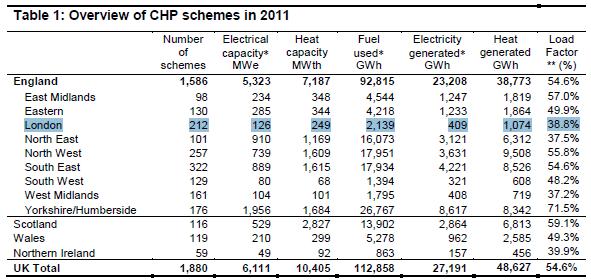 Table 1 highlights that there are 212 CHP schemes in London currently registered with the Government’s CHP Quality Assurance programme (more details at www.chpqa.com). This means that these generation plant have provided details of their operation to the QA programme and qualify for the benefits of being classed as ‘good quality’ such as exemption from the Climate Change Levy. A full list of where these 212 schemes are not unfortunately in the public domain, however, DECC do keep a subset of these schemes (32 listed at the time of writing) on their CHP database (run the region report for London). Additional schemes should also be able to be identified on the London Heat Map. Note – there are likely to be more than 212 schemes – small scale (say around 100kWe and below) CHP engines may not bother registering with the CHPQA as the financial benefits of the CCL exemption may only be modest for such plant.
Table 1 highlights that there are 212 CHP schemes in London currently registered with the Government’s CHP Quality Assurance programme (more details at www.chpqa.com). This means that these generation plant have provided details of their operation to the QA programme and qualify for the benefits of being classed as ‘good quality’ such as exemption from the Climate Change Levy. A full list of where these 212 schemes are not unfortunately in the public domain, however, DECC do keep a subset of these schemes (32 listed at the time of writing) on their CHP database (run the region report for London). Additional schemes should also be able to be identified on the London Heat Map. Note – there are likely to be more than 212 schemes – small scale (say around 100kWe and below) CHP engines may not bother registering with the CHPQA as the financial benefits of the CCL exemption may only be modest for such plant.
409 GWh of electricity were produced by these 212 CHP schemes in 2011. This represented 1.8% of the total CHP-electricity generated in England, and only 1.5% of electricity generated in the UK.
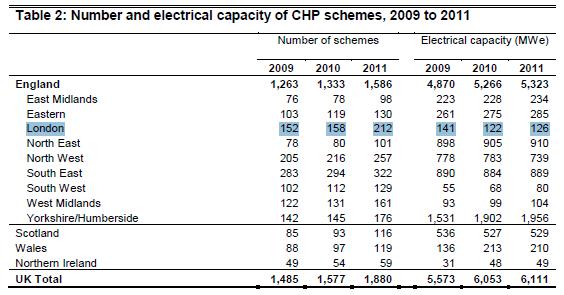 Table 2 however appears to show that, since 2009, there has been a net growth of 50 CHP schemes in London (ie some CHP plant may have been decommissioned – the actual number of new plant isn’t provided – only the net figure of 50). There has been a considerable revision of the numbers since last year’s dataset (for which, see story here) which reported that 188 Good Quality CHP schemes were operational in London as at the end of 2010, as compared with the 158 seen in the table above. Overall a confusing picture!
Table 2 however appears to show that, since 2009, there has been a net growth of 50 CHP schemes in London (ie some CHP plant may have been decommissioned – the actual number of new plant isn’t provided – only the net figure of 50). There has been a considerable revision of the numbers since last year’s dataset (for which, see story here) which reported that 188 Good Quality CHP schemes were operational in London as at the end of 2010, as compared with the 158 seen in the table above. Overall a confusing picture!
More importantly, there appears to have been a massive downward revision in the overall CHP capacity operating in London:
- Last year’s article indicated that there was 185 MWe (electrical capacity) of CHP operating in London in 2010. In contrast, the revised numbers today state only 122 MWe for the same year (2010).
- The latest data now reports that only 126MWe of CHP electrical generating capacity in London in 2011.
- Hence, whilst this latest data indicates a 4MWe increase in 2011 compared to 2010 all previous reports have indicated that approximately 200MWe of CHP capacity operated in London. Hence, this latest data suggests that there is in fact far less CHP operational in London than previously thought leading to a considerable downward revision!
- The 2011 statistics also report that this 126 MWe of CHP produced 409 GWh of electricity and 1,074 of heat GWh heat – a total of 1,483GWh energy in total – a drop by almost 50% of what we thought CHP was generating in London in terms of heat and power up to today as a result of previous DECC datasets.
- All in all, this does little to help the achievement of London’s 2025 25 per cent decentralised energy target – which is estimated in the Mayor’s Climate and Energy Strategy as a total of 23,500 GWh of energy [p86 – see chapter 4 of the Strategy for further information].
Heat Maps produced for every London borough
June 2012: The London Heat Map project has now posted online heat map reports and datasets for every London borough. Information provided sets out that “The new heat maps are higher resolution with real heat consumption data for priority buildings such as hospitals, leisure centres and local authority buildings. As part of this work, each of the boroughs has developed implementation plans to help them take the decentralised energy opportunities identified to the next stages. The implementation plans include barriers and opportunities, actions to be taken by the council, key dates, personnel responsible.”
Posted in Data Store, News
Tagged CHP, Community Heating, Data, Heat Maps, London Heat Map
Leave a comment
Map of London District Heating Schemes
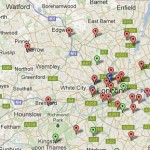 June 2012: The London Heat Map captures a lot of the data related to Combined Heat and Power (CHP) and district heating schemes operating in the capital, but the CHPA have added a welcome web resource – a map of UK district heating schemes which includes a good number of London schemes. DECC also provides a list of CHP schemes operating in London – it’s not comprehensive however as operators are not required to have their details listed. Hence, only 32 schemes are listed on the DECC Public CHP database of the 188 schemes DECC state are operating in London in their latest regional CHP statistics.
June 2012: The London Heat Map captures a lot of the data related to Combined Heat and Power (CHP) and district heating schemes operating in the capital, but the CHPA have added a welcome web resource – a map of UK district heating schemes which includes a good number of London schemes. DECC also provides a list of CHP schemes operating in London – it’s not comprehensive however as operators are not required to have their details listed. Hence, only 32 schemes are listed on the DECC Public CHP database of the 188 schemes DECC state are operating in London in their latest regional CHP statistics.
Posted in Data Store, News
Tagged CHP, Community Heating, Data, Decentralised Energy
Leave a comment
Sky Studios wind turbine spins into action
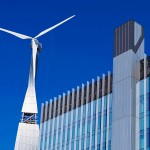 29 May 2012: Sky have announced that they have installed a wind turbine at its West London campus. “The 55-metre Northwind 100 turbine is expected to provide over 133 MWh/year of clean energy to Sky Studios – enough to meet its annual office lighting requirements. The new wind turbine will operate in conjunction with Sky’s recently-commissioned [biomass] Combined Cooling, Heating and Power (CCHP) plant.” Read the full news release here.
29 May 2012: Sky have announced that they have installed a wind turbine at its West London campus. “The 55-metre Northwind 100 turbine is expected to provide over 133 MWh/year of clean energy to Sky Studios – enough to meet its annual office lighting requirements. The new wind turbine will operate in conjunction with Sky’s recently-commissioned [biomass] Combined Cooling, Heating and Power (CCHP) plant.” Read the full news release here.
KX CHP
May 2012: The first of three 2 MW Combined Heat and Power (CHP) engines for the 67 acre King’s Cross Central development has been installed at the on-site energy centre. In total the CHP capacity when finally installed will supply 100% of the development’s heat and offset almost 80% of its electrical power demand. The news release sets out that “Once commissioned, the CHP engine will not only generate electricity, which will be fed into the grid network, but will also provide heat for the development wide District Heating System (DHS). All of the 70 buildings at King’s Cross, from the University of Arts to the Camden Council building, BNP Paribas Real Estate’s new offices and the Great Northern Hotel, will be connected to the DHS When complete carbon emissions are expected to be a third less than ‘business as usual’ and up to 60% less than 2001 levels.”
Further information on the energy strategy for Kings Cross central here and main energy assessment (as set out for the planning application in 2005) can be downloaded here.
Posted in Decentralised Energy, News
Tagged Camden, CHP, Community Heating, Decentralised Energy, Universities
Leave a comment
Vauxhall Nine Elms Battersea Energy Strategy
 April 2012: A planning framework for the Vauxhall / Nine Elms / Battersea Opportunity Area has been finalised and is being adopted as Supplementary Planning Guidance to the London Plan. The OAPF has been produced by the GLA in collaboration with Lambeth and Wandsworth councils, as well as TfL and English Heritage and followed a public consultation process that took place in the winter of 2009/10.
April 2012: A planning framework for the Vauxhall / Nine Elms / Battersea Opportunity Area has been finalised and is being adopted as Supplementary Planning Guidance to the London Plan. The OAPF has been produced by the GLA in collaboration with Lambeth and Wandsworth councils, as well as TfL and English Heritage and followed a public consultation process that took place in the winter of 2009/10.
The framework sets out an ambition for around 16,000 new homes and a range of 20,000 – 25,0000 jobs and includes the creation of a Combined Cooling and Heat Power network. The technical appendices to the planning framework includes a Energy Strategy Masterplan (TA5) which states that “this report finds that the density and diversity of development in the Vauxhall Nine Elms Battersea (VNEB) Opportunity Area (OA) supports a strong case for the development of a low carbon district heating network (DHN). The scheme would supply low carbon heat to developments in the heart of Nine Elms, Battersea Power Station (BPS) and the New Covent Garden Market (NCGM) initially, with the potential to expand north into Albert Embankment and to the more industrial areas of the OA to the west in the future. It is estimated that such a scheme could save in the order of 18,000 tonnes CO2 per annum, with heat being derived from a combination of low/zero carbon sources,including combined heat and power (CHP) plant burning a blend of natural and renewable biogas and heat from a biomass hot water boiler.” Further detail and download energy appendix here.
Posted in Library, News
Tagged CHP, Community Heating, Decentralised Energy, Lambeth, Wandsworth
Leave a comment
Olympic Park – Cutting carbon
March 2012: A briefing event by the IET (Institution of Engineering & Technology) onthe ODA’s approach to “delivering this energy strategy for the Olympic Park, including energy efficient design, the combined cooling heat and power system and renewable energy” with a focus on the district heating network across the site. The event is to take place on 12 March 2012 at the IET London HQ at Savoy Place. Further details and link to book a place here.
Details of the Olympic Park Energy Centre here.
Posted in Events, News
Tagged CHP, Community Heating, Decentralised Energy, Olympics
Leave a comment


